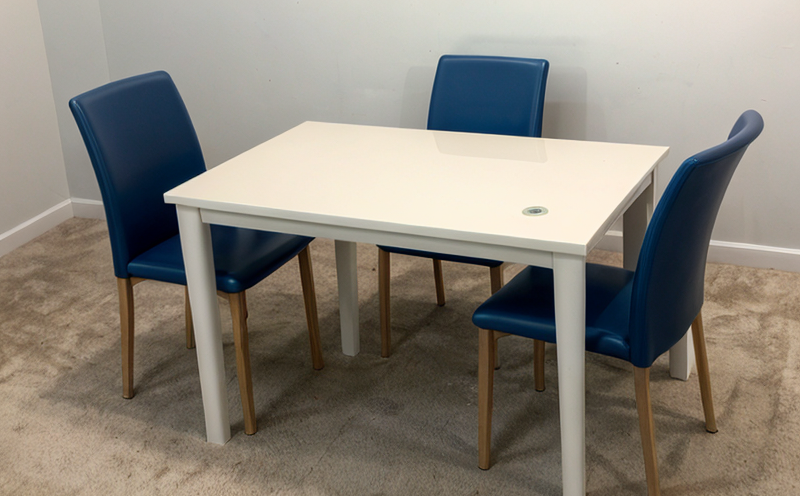NF EN 15372 Mechanical Strength Testing of Plastic Furniture
The NF EN 15372 standard is a European Norm (EN) that sets out requirements and test methods for the determination of mechanical strength properties in plastic furniture. This testing ensures that products meet safety standards, durability expectations, and regulatory compliance.
Understanding mechanical strength is critical when assessing how plastic furniture will perform under various stresses, such as weight, pressure, or impact. The standard applies to a wide range of plastic materials commonly used in the furniture industry, including polyethylene (PE), polypropylene (PP), polystyrene (PS), and acrylonitrile butadiene styrene (ABS).
The testing process involves several key steps that must be followed meticulously. Specimens are prepared according to the specified dimensions outlined in EN 15372, which ensures consistency across different laboratories. The tests assess tensile strength, flexural strength, impact resistance, and compressive strength.
When performing these tests, it is crucial to have the right instrumentation. Commonly used equipment includes universal testing machines (UTMs), three-point bend testers, and drop hammer setups. These instruments are calibrated regularly to ensure accurate results.
The interpretation of test data is also important. Results from these mechanical strength tests provide valuable insights into the structural integrity of plastic furniture components. Compliance with NF EN 15372 not only assures safety but also enhances brand reputation by demonstrating a commitment to quality and innovation in product development.
For instance, manufacturers can use this information during design phases to refine prototypes before large-scale production begins. This ensures that final products are robust enough to withstand typical usage conditions without compromising on aesthetics or comfort.
In addition to meeting regulatory requirements, understanding mechanical properties helps identify potential areas for improvement in future iterations of a product line. By continuously evaluating performance through rigorous testing protocols like those specified by NF EN 15372, companies can stay ahead of competition while maintaining high standards of excellence.
- Consistency across samples
- Calibration of test equipment
- Data interpretation
- Regulatory compliance verification
- Product development refinement
The benefits of adhering to NF EN 15372 extend beyond mere certification; they contribute significantly towards creating safer, more reliable furniture products that meet both industry standards and customer expectations. Compliance also opens up access to international markets where these specifications are recognized as benchmarks for quality.
Benefits
Adopting NF EN 15372 mechanical strength testing offers numerous advantages that extend beyond mere compliance with regulatory standards. Here’s why this service is valuable:
- Enhanced Safety: Ensures that furniture components can withstand expected loads and impacts without failure.
- Promotes Innovation: Allows for the continuous improvement of product designs by understanding how materials behave under stress.
- Market Access: Compliance with international standards opens doors to global markets where these specifications are widely accepted.
- Customer Satisfaction: By ensuring durability and reliability, companies can build trust with their customers who value long-lasting products.
In essence, NF EN 15372 mechanical strength testing is more than just a certification requirement; it’s an investment in the future success of your business by fostering innovation, enhancing safety, promoting market access, and increasing customer satisfaction.
Quality and Reliability Assurance
The implementation of NF EN 15372 testing plays a pivotal role in ensuring both the quality and reliability of plastic furniture. This section outlines some key aspects that contribute to achieving these goals:
- Consistent Sample Preparation: Ensures that all specimens used for testing are prepared according to precise dimensions as specified by EN 15372.
- Regular Calibration of Equipment: Maintains the accuracy and precision necessary for accurate test results.
- Data Interpretation: Properly interpreting the data obtained from mechanical strength tests provides actionable insights that can drive improvements in product design.
- Regulatory Compliance Verification: Ensures adherence to relevant standards, thereby guaranteeing that products meet all necessary safety and performance criteria.
By focusing on these areas, laboratories performing NF EN 15372 mechanical strength testing can consistently deliver high-quality results that instill confidence among stakeholders including manufacturers, regulators, and consumers alike.
Competitive Advantage and Market Impact
Complying with NF EN 15372 not only ensures regulatory compliance but also provides substantial competitive advantages and positive market impacts. Here’s how:
- Innovation Leadership: By staying ahead of industry trends through rigorous testing, companies can introduce new products that set benchmarks for quality.
- Enhanced Reputation: A proven track record of meeting or exceeding international standards enhances brand reputation and builds customer loyalty.
- Better Decision-Making: Access to accurate mechanical strength data allows manufacturers to make informed decisions about material choices, design iterations, and production processes.
- Faster Market Entry: Having already demonstrated compliance with stringent testing requirements can expedite the process of launching new products into international markets.
In today’s competitive landscape, where consumer expectations for safety and durability are constantly evolving, adhering to NF EN 15372 is not just a necessity—it’s an opportunity. It positions companies as leaders in their respective industries, ready to meet the demands of tomorrow's market.





